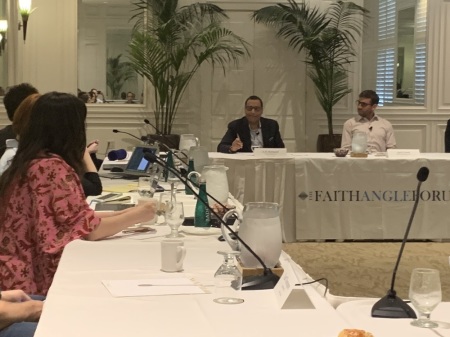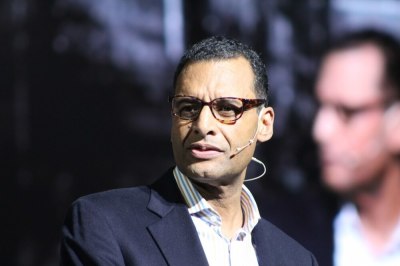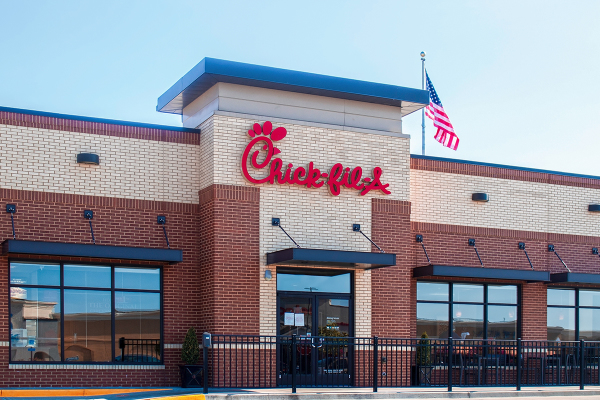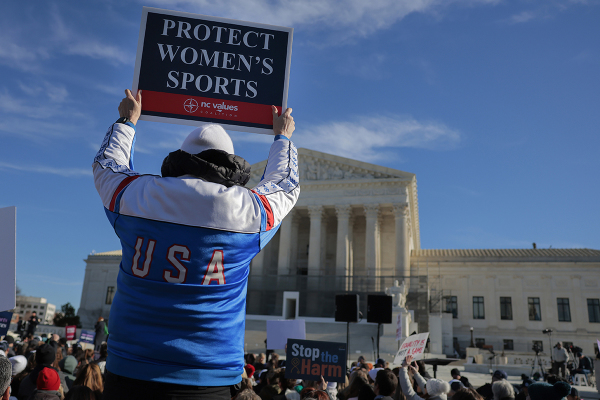AR Bernard says he'll work with Trump but not on evangelical advisory board

MIAMI BEACH, Florida — Pastor A.R. Bernard explained Tuesday why he left President Donald Trump's evangelical advisory board but will continue to work with his administration on issues of concern.
Bernard, who left the evangelical advisory board in August 2017, clarified that he has continued to work with the Trump administration and HUD Secretary Dr. Ben Carson on the inner city initiative, formally known as the White House Opportunity and Revitalization Council.

Bernard is founder and pastor of Christian Cultural Center, a nondenominational megachurch in New York City with over 40,000 members.
Trump announced the formation of the council, to be led by Carson, on Dec. 12.
"With the creation of today’s council, the resources of the whole federal government will be leveraged to rebuild low-income and impoverished neighborhoods that have been ignored by Washington in years past. Our goal is to ensure that America’s great new prosperity is broadly shared by all of our citizens," Trump said at the time.
Earlier that same month, Bernard announced a partnership between his church, the private sector, and government to build a $1.2 billion affordable housing development in Brooklyn.
On Tuesday, Bernard recalled that he left the Faith Leaders Initiative, commonly known as the evangelical advisory council, because "to the public it comes across as" endorsing "everything the president says."
"However," he continued, "I'm still available for the inner city initiative, issues of religious freedom, ... whatever I can do to bring my talents to bear."
Bernard also clarified that he won't "exploit this" by letting "the media use me to go on the talk show circuit to bash my evangelical colleagues" who remain on the board.
He was speaking on a panel at the Faith Angle Forum with Pastor Dimas Salaberrios on the issue of racism, Christianity and the 2015 white supremacist-inspired shooting at Emanuel Baptist Church in Charleston, South Carolina. He was asked about his decision to leave the evangelical advisory board during the Q&A part of the 2.5-hour presentation.
"I'm a gun-toting Republican," Bernard began, then recalled the story of his decision to leave the board.
"I believe that in order for change to take place, people who disagree with each other have to be willing to find common ground, sit down and work together," he said. "I was willing to do that in spite of things that were present even before I got on the advisory council. I got the call. I attended the meeting."
Most of the 27 members on the board were "evangelical colleagues," Bernard said. In particular, he "felt the need to be at the table because there were maybe four persons of color."
"We need to be at the table," Bernard recalled thinking at the time. "We need to have a voice, speak into this administration on issues that are particular to our community."
When he heard the other evangelical voices on the board, they expressed concerns about issues like abortion, same-sex marriage and Israel, Bernard said. And when one member of the board said, "money's not the issue for us, we've got that so we don't need your money," Bernard spoke up and said, "hold it, we need the money," in defense of the needs of his community. At the time, that interaction solidified Bernard's view that he needed to participate in the board.
He also mentioned that others on the board, such as Franklin Graham, "were friends and relationships that continue to this day."
Two events changed his mind, however.
First, the media discovered and published the names of those on the board in April 2017, and along with that media coverage came the perception that those on the board were endorsing and supporting Trump.
"That changed the nature of the relationship," Bernard said, "and put us under pressure because now we're seen as this advisory body to the president, committed and supportive of everything that he had to say."
While that bothered him, it alone wasn't enough to push him off the board. Bernard "had meetings with some of the key leaders in the African-American community," he recalled, who told him, "we want you there, we need to have someone at the table."
So he was able to overlook some of the negative aspects of Trump. "I was able to distinguish between his personal morality and moral judgments, as opposed to moral judgments that affected society as a whole, the common good."
But that changed, Bernard said, with the second event — Trump's response to the racial unrest and white supremacist march in Charlottesville, Virginia, in August 2017.
"So when Charlottesville came up, I waited to see how he would respond, and when he vacillated the way he did, that was problematic. When he finally drew that false equivalence, that was the straw that broke the camel's back," Bernard said.
Trump blamed both sides for the violence and said there were "very fine" people among the white supremacist marchers. While there were violent Antifa counter-protesters at the march, Trump was criticized by many for failing to add moral clarity to the racist messages and to calm the tension.
Conservative evangelical columnist David French wrote at the time, "Donald Trump loves people who love him, and the vile and vicious alt-right has loved him from the beginning. Today, he loved them right back."
Trump's lack of a moral center, which he displayed in reaction to the racism in Charlottesville, led Bernard to leave the board.
"I said, OK, he's not a moral man, I'd prefer that. But he's not immoral, I would understand that. He's amoral, which means he's transactional. If you go whichever direction suits the transaction at the time, that's unpredictable. I can't follow that kind of leadership," he said.





















